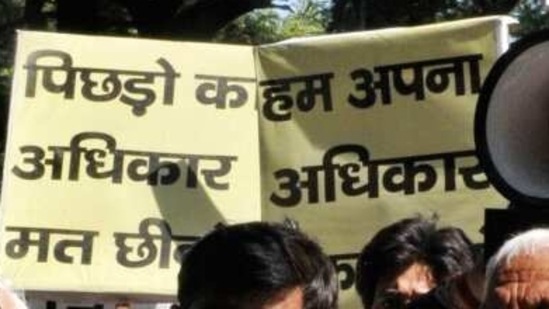Split in OBC quota may help most backward from next year
2 panel members confirmed that they will recommend the current 27% quota be broken up into 4, or even 5 sub-categories.
Reservations for people from other backward classes (OBCs) in central government jobs and educational institutions may start including a component for the most backward among these as early as 2022 should the government accept proposals being evaluated by the Justice Rohini Commission, which hoped to submit its findings by July. It was recently granted an extension till July 31.

“We submit it as soon as we return from our state consultations and if accepted, it could be implemented within the year. The President of India also has to issue the gazetted list of OBC castes that has been pending for a while,” said Jatinder K Bajaj, member of the commission.
Two members of the commission confirmed that they will recommend that the current 27% quota for OBCs be broken up into four, even five sub-categories, so that the most deprived comprising 983 sub-castes of the total 2,633 castes have a quota of at least 2%. “It is a game-changing idea,’’ said JK Bajaj, member of the commission, explaining the plan to split the 27% into a combination of 2%, 6%, 9% and 10%, or a similar combination split into five categories with 2-4% for the most deprived who were not getting any benefits till now and the most empowered sub-castes like the Yadavs being limited to just 10%. “The lowest category will start getting four to five times what they have got in Central government jobs, and admissions in central educational institutions... .’’
Bajaj’s reference is to the number of people from the lowest strata who currently make it to these institutions or qualify for jobs through UPSC examinations. It has found, for instance, that most beneficiaries in the last three years, belong to just 10 sub-castes .
“There is a high level of inequity in the distribution of the benefits across different communities,” a consultation paper by the commission said. “The inequity across different States and UTs is almost as acute as across different castes and communities in the central list.”
The commission was appointed by the President of India in October 2017. If accepted, the recommendations are also likely to have a major impact on politics, especially in north India where the rise of powerful OBC groups such as Yadavs defined the 1990s.
“BJP has seen maximum expansion in the OBCs. That’s where hindutva-isation has maximum scope. That’s the space that the BJP has got maximum dividends... The OBCs also look upward as a process of sanskritisation and so politically it makes sense for the party to cultivate them,’’ said SS Jodhka, sociology professor at the Jawaharlal Nehru University.
The commission is also recommending a complete digitisation of all OBC records and a standardised system of issuing OBC certificates.






